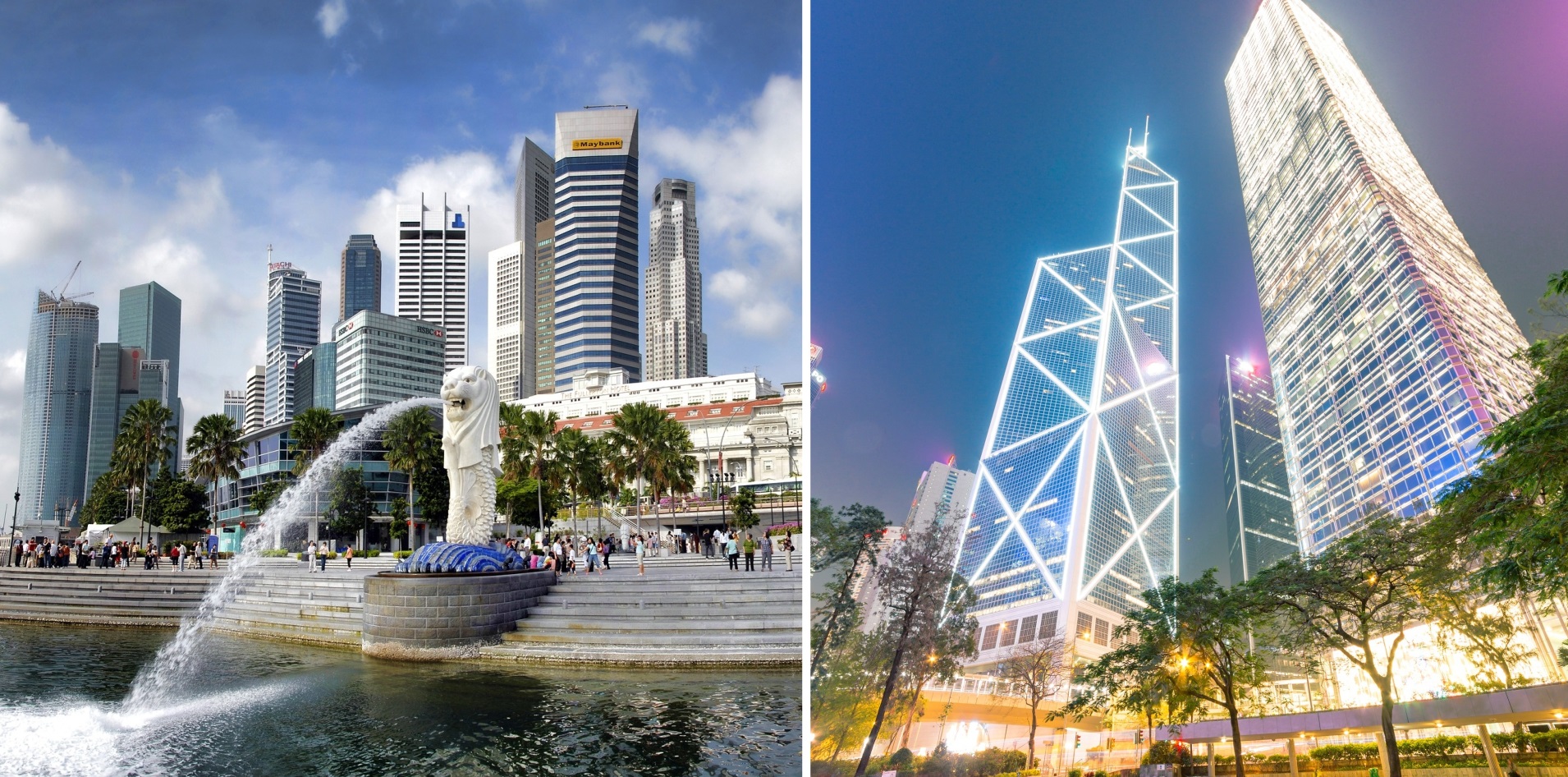Working in Singapore vs Hong Kong: Working Hours, Salary, and Other Comparisons

For decades, Hong Kong and Singapore has been considered some of the best places to work and live in Asia. The two regions’ tax breaks and foreigner-friendly policies are two reasons they have been able to successfully attract foreign businesses.
Hong Kong and Singapore are seen neck and neck in terms of providing a fertile business landscape for expats and foreign investors. There are macro and micro considerations when it comes to examining the two countries. While Hong Kong’s proximity to China remains to be a huge draw for international investors. Singapore's stable political landscape and support for innovation, have placed the nation among the most successful cities in the world in attracting foreign investment.
Historically, both cities have been favored as the Asia base for many multi-national corporations entering Asia. This is partly due to comparative political stability, a reliable legal system, banking, and financial regulations that coincides with global compliance demands, as well as the prevalence of English. Taken together, these qualities present ample opportunities for businesses across many different industries. In this article, learn about the finer points of these two regions that may tip the scale towards one or the other.
Working Permit Requirements as a Foreigner
To start with, it’s worth looking into the ins and outs of working in Singapore as a foreigner from the standpoint of visa requirements.
Singapore is keen to attract upper-level managers and executives. They’ve developed the Singapore Employment Pass, geared towards foreign professionals who earn US$3,600 or more per month and have the requisite qualifications. It’s a difficult category to qualify for and there are more Singapore working pass types, but none of them is friendly to foreigners without a long and stable history of employment.
There are numerous Singapore working permit requirements and they are measured on skill sets and level, income level, education, and other factors.
Hong Kong, on the other hand, has a single work visa application process. The government issues work permits to qualified professionals under the Employment for Professionals scheme. The application process requires a job offer in Hong Kong, a clean record, educational history, and a salary that’s on par with locals.
Hong Kong Vs Singapore – Working Hours Comparison
Singapore is one of the most globalised economies in the world. For that reason, working hours vary widely depending on the type of business and related global interests.
The Singapore standard working hours are from 9:00 am to 1:00 pm and from 2:00 pm to 5:00 pm. Saturdays are typically a half-day for many companies as well from 9:00 am to 1:00 pm. The maximum hours required per week are 44 and residents past the retirement age of 60 aren’t required to work at all.
There are eleven public holidays and eight major festivals in Singapore. The cultural diversity is represented by the holidays the city state observes, including Christmas and Easter and the Hindu Deepavali, among others. Most companies close for Chinese New Year as well.
In Hong Kong, working hours are generally from 9:00 am to 6:00 pm but many companies require different schedules depending on requirements. There are 17 public holidays, whilst annual leaves range typically between 7 and 15 days.
Read More
- How Hong Kong's Working Hours Stack Up In Asia
- Understanding Maternity and Paternity Leave Policies in Hong Kong
Hong Kong Vs Singapore Salary – A Comprehensive Comparison
According to the 2023 Hong Kong Salary Guide, the average salary in Hong Kong is HKD 439,000 per year, which amounts to approximately USD 55,928. The average expat salary in Singapore was SGD 119,927 per year, which amounts to USD 88,045, according to a study by ECA International. Despite earning less, many people choose to immigrate to Singapore from Hong Kong. Many cite the long working hours as a reason for moving to Singapore for work. Moreover, despite variations in salary, both Hong Kong and Singapore are extremely lucrative work locations.
Statistically, a recent report by the Organization for Economic Cooperation and Development (OECD) states that people in Hong Kong work 44 hours per week on average. While Hong Kong doesn’t have a statutory standard working hour system or a statutory maximum number of hours, there are regulations for people working in certain professions or under certain ages related to how many hours they may work. In comparison, the average work hours in Singapore are around 44.1 hours per week according to the Ministry of Manpower. However, the maximum number of work hours per week in Singapore is 44 hours. Employers typically end work an hour earlier on Friday, so the typical work hours in Singapore are 40 to 44 hours. In sum, both cities showcase a workforce that attributes a similar number of hours to work. Given the similarities between the two cities, it is not surprising that in both Hong Kong and Singapore, the industries that are yielding the highest salary include Banking & Financial Services, Insurance, Technology, Accounting & Finance, HR and Business Support Sales & Marketing Life Sciences.
Taxation Matters: Singapore Vs. Hong Kong Tax Regimes
One of the main concerns for anyone looking to do business anywhere is taxation policies. Although both Singapore and Hong Kong have relatively favorable tax schemes for foreign investors and skilled immigrants, Hong Kong and Singapore have different tax regimes. While Hong Kong follows a territorial basis of taxation where offshore profits are generally not subject to tax, Singapore generally imposes income tax on all foreign sourced income. Both Hong Kong and Singapore have a Foreign-Sourced Income Exemption (FSIE) regime according to a report by EY, with differences between the two regimes. The PTE regime in Singapore is applicable to all companies, provided that they pay normal tax rates. In contrast, the two-tiered system in Hong Kong is restricted to only one enterprise within each group of enterprises. EY and Tricor Global can be referred to for more information about the tax regimes in Hong Kong and Singapore.
Personal taxes in both cities work on a tiered system. Personal income tax in Singapore starts at 3.5% and rises to 20% for the highest-earning brackets. In Hong Kong, a similar system starts at 2% and rises to 17% for top earners. Despite this discrepancy, Singapore’s effective net tax rate is lower for personal income.
Personal taxes in both cities work on a tiered system. Personal income tax in Singapore starts at 3.5% and rises to 20% for the highest-earning brackets. Personal income tax in Singapore can be reduced by taking advantage of tax relief schemes such as Supplementary Retirement Scheme (SRS), CPF cash top-up relief, qualifying donations, and more. In Hong Kong, a similar system starts at 2% and rises to 17% for top earners. Personal income tax in Hong Kong can be reduced by taking advantage of tax relief schemes such as Home Loan Interest Allowance, Deduction for Housing, You Can Choose Your Tax Rate, Get Deductions for Your Donations to Charitable Organisations, Deduct Your Mandatory Provident Fund (MPF), and more.
Despite discrepancy in its tax regime, Singapore’s effective net tax rate is lower for personal income. Both cities have similar corporate tax rates as well. Hong Kong’s headline corporate tax rate is set at 16.5% for assessable profits from corporations and 15% for unincorporated businesses. Singapore’s corporate tax sits at a flat 17%. Both regions have competitive tax structures. Whether it’s profitable to move operations to either for a business will, therefore, largely depend on the type of industry and potential extraneous benefits.
Read More
- Your Complete Guide to Company Registration in Singapore
- Entrepreneur's Guide to Doing Business in Singapore: Introduction to Entrepass
Work Culture and Lifestyle
The Singaporean work culture is notable for its multicultural influences and conventions that guide employee behavior. The workplace culture in private organisations and public sector institutions mostly values traditional local values. In contrast, the work culture in Hong Kong is known for its fast-paced and competitive nature, with long working hours being the norm in many industries. Hong Kong is celebrated for its assimilation of East and West values due to its colonial history. Both countries offer the infrastructure that caters to a range of lifestyles for after work recreational purposes based on personal preferences and liking, much like in any other metropolitan city across the globe. Moreover, employees in Hong Kong are legally entitled to a minimum of 7 days of annual leave with pay per 12 months. This can increase to 14 days depending on how long an employee has been with the company. In Singapore, annual leave amounts to a minimum of 7 days per 12 months, and an additional 1 day for every year of service, for up to 14 days.
Cost of Living
The average cost of living in Hong Kong and Singapore will be examined in the following paragraphs.
Singapore
The cost of living in Singapore is relatively expensive in comparison to neighbouring countries. According to Numbeo, a family of four estimated monthly costs are $4,078.5 without rent while a single person estimated monthly costs are $1,132.4 without rent. Moreover, the average rent for a single room in Singapore is $2,920. This number increases depending on the neighbourhood and the number of individuals it houses, as rent can vary depending on the location and type of accommodation. Finally, the average cost of living in Singapore is $1,336, which covers expenses such as accommodation, food, healthcare, education, utility, entertainment, and transportation.
Hong Kong
In comparison, the cost of living in Hong Kong is equally expensive. A family of four estimated monthly costs are $4,074.8 without rent. A single person estimated monthly costs are $1,150.7 without rent. Not surprisingly, this number fluctuates in Hong Kong as rent can vary vastly depending on the location, size and type of accommodation. The average cost of living in Hong Kong is rounding at $2,733, which is in the top 3% of the most expensive cities in the world according to Numbeo. It is worthwhile to note that this number is largely affected by personal preference and lifestyle choices as the city offers a plethora of lifestyle amenities that cater to different income groups.
The Fragrant Harbour vs the Lion City
Both Singapore and Hong Kong are leading destinations for personal immigration and foreign investment or business expansion. There are a few differences, with Hong Kong being a little more profitable in some scenarios, but Singapore offering a more comfortable quality of life. Both locations make great considerations for businesses to flourish.
Read More
- A Step-by-Step Guide to Doing Business in Hong Kong
- Is Smart City in Hong Kong's Future? A Glimpse into Smart City Initiatives in the City
Conclusion
In retrospect, Hong Kong and Singapore has been rated among the best localities to work and live in Asia. Among a plethora of social and economic factors, including the cities’ infrastructure, public space and transportation systems, culture, lifestyle amenities, education system just to name a few. In addition, the two cities tax regimes, coupled with its relatively favorable tax schemes and foreigner-friendly regulatory policies for foreign investors and skilled immigrants, further contributes to its attractiveness to working professionals, international businesses as well as foreign investment.
In general, macro and micro considerations exist between the two cities. While Hong Kong’s proximity to China remains to be a huge advantage in the eyes of international investors. Singapore's stable political landscape and support for innovation, have placed the nation among the most successful cities in the world in attracting foreign investment. Moving forward, these qualities present ample opportunities for businesses across many different industries to grow and continuously prosper in a meaningful manner.





